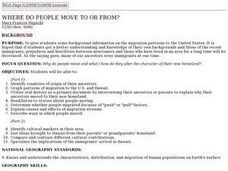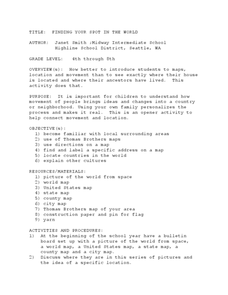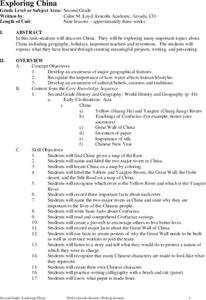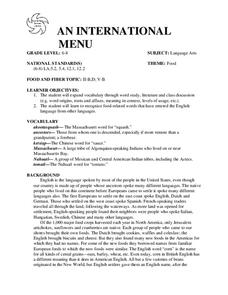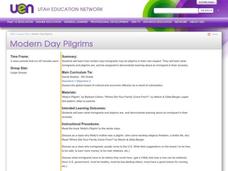California Academy of Science
Human Evolution
As the great and hilarious Tim Minchin once said, "Science is simply the word we use to describe a method of organizing our curiosity." Science is more than just a guess; it is based on questions, observations, and evidence. High...
Curated OER
Where Were Your Ancestors in 1871?
Here is a nicely designed lesson on ancestry and family history. In it, learners read an article entitled, "Where Were Your Ancestors in 1871?" Then, they make up a series of questions to profile their family and their community 100...
DocsTeach
Evaluating a Needlework Sampler as Historical Evidence
Needlework isn't just for home decor; it can also help record family history. Academics analyze a needlework sampler to understand how they were used to record marriages and births. The activity includes a series of written questions,...
Smithsonian Institution
Ceramica de los Ancestros
Scholars join a field expedition team to unearth a plethora of treasures from Central America. Artifacts listed in alphabetical order come with an informational blurb and a picture designed for participants to color. Activity pages...
Smithsonian Institution
Dia de los Muertos: Honoring our Ancestors Through Community Celebration
Oral storytelling has been an important part of every culture. The time-honored practice uses stories as a conduit for a culture's values and customs from one generation to the next. Keep the tradition going with a family interview...
Curated OER
Immigration and Ancestors
We are all immigrants to this country and the study of immigration can help students connect to history in a personal way. Students will listen to audio clips from the Ellis Island web site, discuss the treatment of immigrants in the...
Curated OER
Where Do People Move To Or From?
Students identify countries of origin of their ancestors, graph patterns of migration to the U.S. and Hawaii, then utilize oral history as a primary document by interviewing their ancestors or parents to explain why they moved to their...
Curated OER
Finding Your Spot in The World; Geography, Maps, Multi-Culturalism
Students use a variety of maps to locate their home, their school and the origin of their ancestors.
Curated OER
Immigration and Ellis Island
Fourth graders explore family histories. For this social studies lesson, 4th graders identify the countries from which their ancestors came and locate them on a map. Students discuss the role that Ellis Island played in immigration in...
Aquarium of the Pacific
Turn a Cow into a Whale
Third graders explore animals that might have a common ancestor and resemble one another. For this cow and whale lesson, 3rd graders recognize the similarities between the whale and the cow. Students complete worksheets based on the...
Curated OER
My Family Tree
Students create a family tree. In this ancestry lesson plan, students research a country that one of their ancestors is from. Students interview a grandparent and map out a family tree.
Curated OER
Ancestors
Students investigate the concepts of ancestors and citizenship. In this citizenship lesson, students listen to Betsy Maestro's Coming to America . They learn the definitions of immigrants and melting pot using a recipe for Rice Krispie...
Curated OER
FOOD FOR THE ANCESTORS
Students identify the foods associated with the "Days of the Dead Celebration." They compare and contrast these foods to the foods associated with American celebrations and become familiar with the foods of Mexico and their relationship...
Curated OER
Exploring China
Second graders explore the geography, holidays, important teachers, and inventions from China in the nine lessons of this unit. The results of their inquiries are expressed through a variety of products, writings, and presentations.
Curated OER
Human Evolution
Students examine fossils in order to study humans and how humans evolved over time. In this human evolution activity students examine different genetic relationships between humans and other species.
Curated OER
Ancestors in the Americas: Lesson One
Students are introduced to the characteristics of documentaries and making films. Individually, they write their own proposal for an idea of a documentary making sure to identify the point of view of which it is going to be filmed. ...
Curated OER
AN INTERNATIONAL MENU
Studentsl expand vocabulary through word study, literature and class discussion (e.g. word origins, roots and affixes, meaning in context, levels of usage, etc.). They recognize food-related words that have entered the English language...
Curated OER
American History: Finding your Voice
Learners are able to write a speech and create a slogan through analysis of current issues articles dealing with pesticide use. They put themselves in the position of one of the workers affected by the story they read.
Curated OER
Immigration in the United States
Students examine the theory of immigration and how their ancestors became part of this Nation. They determine how immigration affected the United States through research and language activities. They construct a timeline of a time in...
Curated OER
Modern Day Pilgrims
Students examine the similarities and differences between modern day immigrants and pilgrims. They listen to stories, discuss their ancestors' origins, and create a native costume for a paper doll for where their ancestor is from.
Curated OER
Family Fables, Facts, and Other True Stories
Pupils conduct an interview about their family with their parents and/or grandparents. They write a story based on interview facts and create a presentation for the class.
Curated OER
We the People (Cultural Research)
Fourth graders conduct cultural research, collect oral histories using tape recorders and cameras, and share their ancestral heritage with classmates through family heirlooms and ethnic foods.
Curated OER
Celebrate Your Heritage
Students investigate what countries their ancestors originally came from and locate them on a world map. They use a map to plot the ancestral path that has led to their hometown. They create a travel log outlining facts/data about...
Curated OER
Creative Writing/Historical Journals
Students research primary and secondary sources to find information about their ancestors. They write a series of journal entries, from the perspective of one of their ancestors, on what life was like in that given time period.








